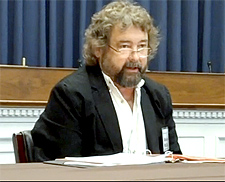 Today, Senator Robert C. Byrd (D-WV) released a historic statement representing a complete turnaround from the Senator’s prior defense of the horrific practice of mountaintop removal. Senator Byrd recognizes that mountaintop removal has reduced jobs in the coalfields and chastised the industry for causing unrest in the coalfields over the increased oversight that mountaintop removal is receiving by federal regulatory agencies. Most importantly Senator Byrd recognized that most Americans and members of Congress are opposed to mountaintop removal and made reference to the bipartisan support of the Clean Water Protection Act and the Appalachia Restoration Act, which would stop the most egregious forms of mountaintop removal. This statement creates an even more favorable environment for Congress to pass legislation that will provide relief and protection from mountaintop removal for the citizens of Appalachia. Senator Byrd is the longest serving Senator in Unites States history, and remains one of the most powerful politicians in Congress. His recognition that mountaintop removal is having negative impacts on Appalachian citizens and that the coal industry is going to have to change the status quo is a powerful testament to the work of citizens from across West Virginia, across Appalachia, and across America who are fighting for justice. Because of our shared work for progress, change is coming.
Today, Senator Robert C. Byrd (D-WV) released a historic statement representing a complete turnaround from the Senator’s prior defense of the horrific practice of mountaintop removal. Senator Byrd recognizes that mountaintop removal has reduced jobs in the coalfields and chastised the industry for causing unrest in the coalfields over the increased oversight that mountaintop removal is receiving by federal regulatory agencies. Most importantly Senator Byrd recognized that most Americans and members of Congress are opposed to mountaintop removal and made reference to the bipartisan support of the Clean Water Protection Act and the Appalachia Restoration Act, which would stop the most egregious forms of mountaintop removal. This statement creates an even more favorable environment for Congress to pass legislation that will provide relief and protection from mountaintop removal for the citizens of Appalachia. Senator Byrd is the longest serving Senator in Unites States history, and remains one of the most powerful politicians in Congress. His recognition that mountaintop removal is having negative impacts on Appalachian citizens and that the coal industry is going to have to change the status quo is a powerful testament to the work of citizens from across West Virginia, across Appalachia, and across America who are fighting for justice. Because of our shared work for progress, change is coming.
Here is Senator Byrd’s complete statement:
COAL MUST EMBRACE THE FUTURE
Senator Robert C. Byrd (D-W.Va.)
For more than 100 years, coal has been the backbone of the Appalachian economy. Even today, the economies of more than 20 states depend to some degree on the mining of coal. About half of all the electricity generated in America and about one quarter of all the energy consumed globally is generated by coal.
Change is no stranger to the coal industry. Think of the huge changes which came with the onset of the Machine Age in the late 1800’s. Mechanization has increased coal production and revenues, but also has eliminated jobs, hurting the economies of coal communities. In 1979, there were 62,500 coal miners in the Mountain State. Today there are about 22,000. In recent years, West Virginia has seen record high coal production and record low coal employment.
And change is undeniably upon the coal industry again. The increased use of mountaintop removal mining means that fewer miners are needed to meet company production goals. Meanwhile the Central Appalachian coal seams that remain to be mined are becoming thinner and more costly to mine. Mountaintop removal mining, a declining national demand for energy, rising mining costs and erratic spot market prices all add up to fewer jobs in the coal fields.
These are real problems. They affect real people. And West Virginia’s elected officials are rightly concerned about jobs and the economic impact on local communities. I share those concerns. But the time has come to have an open and honest dialogue about coal’s future in West Virginia.
Let’s speak the truth. The most important factor in maintaining coal-related jobs is demand for coal. Scapegoating and stoking fear among workers over the permitting process is counter-productive.
Coal companies want a large stockpile of permits in their back pockets because that implies stability to potential investors. But when coal industry representatives stir up public anger toward federal regulatory agencies, it can damage the state’s ability to work with those agencies to West Virginia’s benefit. This, in turn, may create the perception of ineffectiveness within the industry, which can drive potential investors away.
Let’s speak a little more truth here. No deliberate effort to do away with the coal industry could ever succeed in Washington because there is no available alternative energy supply that could immediately supplant the use of coal for base load power generation in America. That is a stubborn fact that vexes some in the environmental community, but it is reality.
It is also a reality that the practice of mountaintop removal mining has a diminishing constituency in Washington. It is not a widespread method of mining, with its use confined to only three states. Most members of Congress, like most Americans, oppose the practice, and we may not yet fully understand the effects of mountaintop removal mining on the health of our citizens. West Virginians may demonstrate anger toward the Environmental Protection Agency (EPA) over mountaintop removal mining, but we risk the very probable consequence of shouting ourselves out of any productive dialogue with EPA and our adversaries in the Congress.
Some have even suggested that coal state representatives in Washington should block any advancement of national health care reform legislation until the coal industry’s demands are met by the EPA. I believe that the notion of holding the health care of over 300 million Americans hostage in exchange for a handful of coal permits is beyond foolish; it is morally indefensible. It is a non-starter, and puts the entire state of West Virginia and the coal industry in a terrible light.
To be part of any solution, one must first acknowledge a problem. To deny the mounting science of climate change is to stick our heads in the sand and say “deal me out.” West Virginia would be much smarter to stay at the table.
The 20 coal-producing states together hold some powerful political cards. We can have a part in shaping energy policy, but we must be honest brokers if we have any prayer of influencing coal policy on looming issues important to the future of coal like hazardous air pollutants, climate change, and federal dollars for investments in clean coal technology.
Most people understand that America cannot meet its current energy needs without coal, but there is strong bi-partisan opposition in Congress to the mountaintop removal method of mining it. We have our work cut out for us in finding a prudent and profitable middle ground – but we will not reach it by using fear mongering, grandstanding and outrage as a strategy. As your United States Senator, I must represent the opinions and the best interests of the entire Mountain State, not just those of coal operators and southern coalfield residents who may be strident supporters of mountaintop removal mining.
I have spent the past six months working with a group of coal state Democrats in the Senate, led by West Virginia native Senator Tom Carper (D-Del.), drafting provisions to assist the coal industry in more easily transitioning to a lower-carbon economy. These include increasing funding for clean coal projects and easing emission standards and timelines, setting aside billions of dollars for coal plants that install new technology and continue using coal. These are among the achievable ways coal can continue its major role in our national energy portfolio. It is the best way to step up to the challenge and help lead change.
The truth is that some form of climate legislation will likely become public policy because most American voters want a healthier environment. Major coal-fired power plants and coal operators operating in West Virginia have wisely already embraced this reality, and are making significant investments to prepare.
The future of coal and indeed of our total energy picture lies in change and innovation. In fact, the future of American industrial power and our economic ability to compete globally depends on our ability to advance energy technology.
The greatest threats to the future of coal do not come from possible constraints on mountaintop removal mining or other environmental regulations, but rather from rigid mindsets, depleting coal reserves, and the declining demand for coal as more power plants begin shifting to biomass and natural gas as a way to reduce emissions.
Fortunately, West Virginia has a running head-start as an innovator. Low-carbon and renewable energy projects are already under development in West Virginia, including: America’s first integrated carbon capture and sequestration project on a conventional coal-fired power plant in Mason County; the largest wind power facility in the eastern United States; a bio-fuel refinery in Nitro; three large wood pellet plants in Fayette, Randolph, and Gilmer Counties; and major dams capable of generating substantial electricity.
Change has been a constant throughout the history of our coal industry. West Virginians can choose to anticipate change and adapt to it, or resist and be overrun by it. One thing is clear. The time has arrived for the people of the Mountain State to think long and hard about which course they want to choose.
 As Earth Day nears I can’t help but remember the first time I had the pleasure to meet Larry Gibson. This “Keeper of the Mountains” introduced me to the ugly truth regarding destruction of the Appalachian Mountains fueled by greed.
As Earth Day nears I can’t help but remember the first time I had the pleasure to meet Larry Gibson. This “Keeper of the Mountains” introduced me to the ugly truth regarding destruction of the Appalachian Mountains fueled by greed. I’ll never forget him showing me where a spring once bubbled up from the earth behind his cabin and talking about how different things had became when one day the spring simply stopped.
I’ll never forget him showing me where a spring once bubbled up from the earth behind his cabin and talking about how different things had became when one day the spring simply stopped.


 After intense pressure from Ohio Citizen Action, and other constituents, Senator Sherrod Brown from the coal state of Ohio officially became the 11th cosponsor of SB 696, the
After intense pressure from Ohio Citizen Action, and other constituents, Senator Sherrod Brown from the coal state of Ohio officially became the 11th cosponsor of SB 696, the 



 The first time I met Ben Sollee when he came to perform for us during our training in Washington DC at our Annual End Mountaintop Removal Week in Washington. There were close to 150 concerned citizens from California to the Carolinas, and many who were directly impacted by mountaintop removal. Armed only with his cello and soulful voice, Ben made many of us in the room cry with his awe-inspiring rendition of “A Change is Gonna Come”. It was definitely the highlight of the day.
The first time I met Ben Sollee when he came to perform for us during our training in Washington DC at our Annual End Mountaintop Removal Week in Washington. There were close to 150 concerned citizens from California to the Carolinas, and many who were directly impacted by mountaintop removal. Armed only with his cello and soulful voice, Ben made many of us in the room cry with his awe-inspiring rendition of “A Change is Gonna Come”. It was definitely the highlight of the day. Today, Senator Robert C. Byrd (D-WV) released a historic statement representing a complete turnaround from the Senator’s prior defense of the horrific practice of mountaintop removal. Senator Byrd recognizes that mountaintop removal has reduced jobs in the coalfields and chastised the industry for causing unrest in the coalfields over the increased oversight that mountaintop removal is receiving by federal regulatory agencies. Most importantly Senator Byrd recognized that most Americans and members of Congress are opposed to mountaintop removal and made reference to the bipartisan support of the
Today, Senator Robert C. Byrd (D-WV) released a historic statement representing a complete turnaround from the Senator’s prior defense of the horrific practice of mountaintop removal. Senator Byrd recognizes that mountaintop removal has reduced jobs in the coalfields and chastised the industry for causing unrest in the coalfields over the increased oversight that mountaintop removal is receiving by federal regulatory agencies. Most importantly Senator Byrd recognized that most Americans and members of Congress are opposed to mountaintop removal and made reference to the bipartisan support of the 

 Appalachian Voices, along with the Stop Cliffside Coalition, continues to fight the construction of Duke Energy’s coal-fired power plant in Rutherford County, NC. Duke Energy wants customers to pay more dirty energy that emits global warming gases and other air pollution, destroy the Appalachian mountains, and produces toxic coal ash ponds.
Appalachian Voices, along with the Stop Cliffside Coalition, continues to fight the construction of Duke Energy’s coal-fired power plant in Rutherford County, NC. Duke Energy wants customers to pay more dirty energy that emits global warming gases and other air pollution, destroy the Appalachian mountains, and produces toxic coal ash ponds.  Appalachian Voices, as part of the Alliance for Appalachia, has been organizing monthly mini-lobby weeks to Washington, DC since our last big lobby week in March. These mini-lobby weeks have become an integral part of our work, as they increase our power on Capitol Hill, empower citizens from the Appalachian coalfields and beyond, and sends a message to the coal industry that we are not going away any time soon. These mini-lobby weeks are one of the main reasons the Clean Water Protection Act in the House has a record 156 cosponsors and the Appalachia Restoration Act was introduced in the Senate earlier this year. This lobby week was a little bigger than usual, as we had some citizens from key Congressional districts from as far away as California & Oregon join us.
Appalachian Voices, as part of the Alliance for Appalachia, has been organizing monthly mini-lobby weeks to Washington, DC since our last big lobby week in March. These mini-lobby weeks have become an integral part of our work, as they increase our power on Capitol Hill, empower citizens from the Appalachian coalfields and beyond, and sends a message to the coal industry that we are not going away any time soon. These mini-lobby weeks are one of the main reasons the Clean Water Protection Act in the House has a record 156 cosponsors and the Appalachia Restoration Act was introduced in the Senate earlier this year. This lobby week was a little bigger than usual, as we had some citizens from key Congressional districts from as far away as California & Oregon join us.